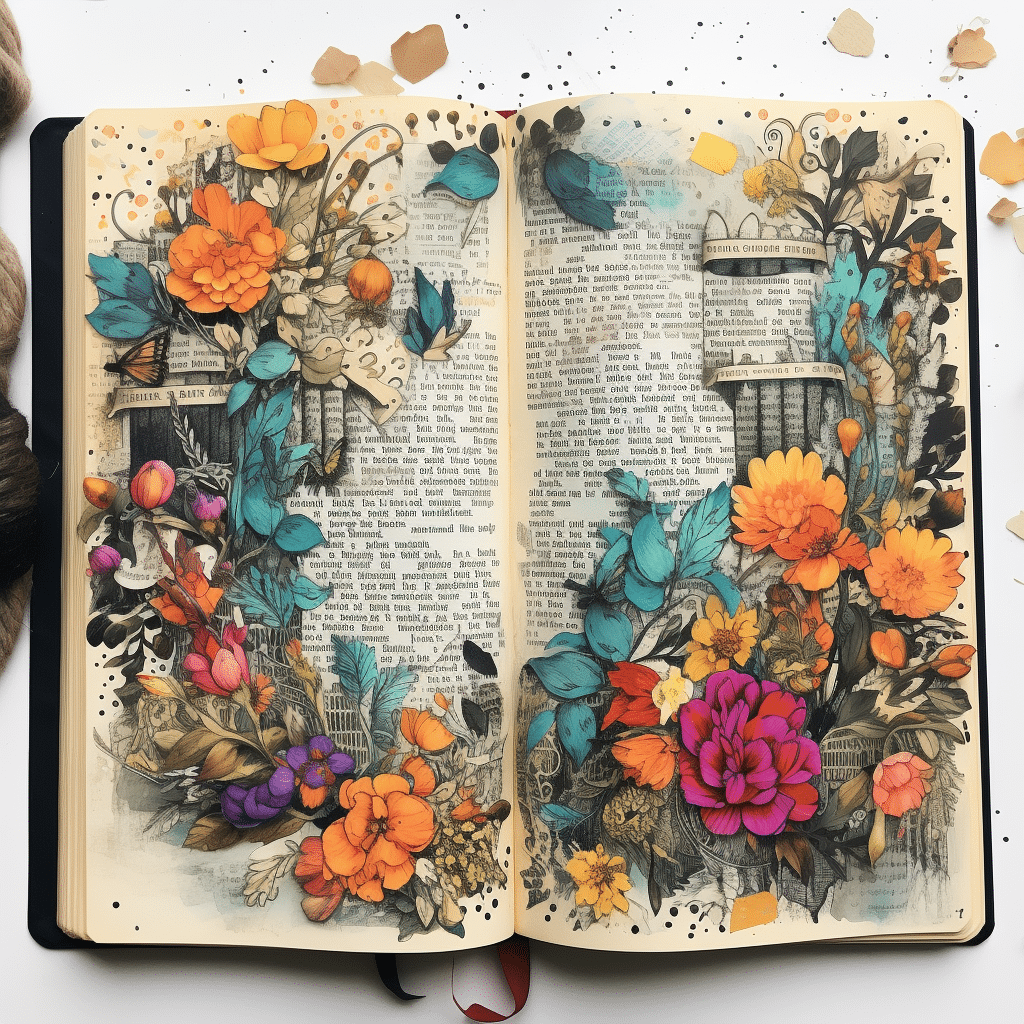
Bible offers a unique way to study the Bible. It combines writing and drawing with prayerful reflection, enabling individuals to connect with the Word of God. This practice encourages personal interpretation and expression. It goes beyond mere reading, inspiring creative expression with colorful illustrations and calligraphy. Watercolors, pens, stickers, or even photographs can be used in journals.
The combination of visual representation and written reflection helps to internalize scriptural truths by engaging various areas of the brain. This type of immersive experience often leaves a lasting impression. The merging of creative expression and scripture holds great potential for spiritual growth.
Bible journaling has ancient roots, dating back centuries to when illuminated manuscripts were created by monks and scribes. These works featured detailed illustrations and transcribed scriptures. Today, contemporary tools and mediums are used to take inspiration from this rich heritage.
What is Bible journaling?
Bible journaling is a fun way to study the Bible. It combines art and scripture, so people can reflect on the teachings of the Bible. It involves choosing a verse or passage from the Bible and expressing it through art. This can be done with watercolors, pencils, markers, calligraphy, or typography.
Bible journaling encourages people to think more deeply about the scripture. While creating the artwork, people can meditate on the chosen verses and develop a stronger connection to God’s message.
Another benefit of Bible journaling is it helps people remember the Bible better. Using art to visualize scripture helps people remember specific verses or lessons.
Pro Tip: When starting out, pick verses that are meaningful to you. This will make Bible journaling more enjoyable.
Benefits of Bible journaling as a way to study the Bible

Bible journaling offers many benefits! Visually engaging with scripture helps you to better understand and make personal connections to the text. Here are six reasons to try it:
- Reflective Practice: Bible journaling helps you reflect on scriptures and apply them to your life.
- Enhanced Comprehension: Writing or drawing while you study improves understanding and retention.
- Personal Expression: Through art, you can express emotions, thoughts, and prayers related to the scriptures.
- Visual Reminders: Visual elements created during journaling remind you of important lessons.
- Spiritual Growth: Regular Bible journaling leads to personal growth and spiritual transformation.
- Journal Archives: Your Bible journal documents your spiritual journey and serves as future inspiration.
Start Bible journaling today and draw closer to God!
Getting started with Bible journaling
Bible journaling is a captivating way to explore the Bible. It’s a unique experience combining journaling and reflecting on scripture. Here are 6 points to get you started:
- Pray first: Ask God for guidance before you start. Invite Him to speak through His words and guide you as you journal.
- Choose materials: Get a journal and pens, markers or coloured pencils. Add stickers, washi tapes or other decorations if you like.
- Select a passage: Pick out a verse or scripture that speaks to you. It could be something you’re studying, or something related to your life.
- Read & reflect: Read the passage slowly, and highlight words that stand out. Think about what it means and how it connects to your life.
- Create artwork: Use materials to represent the message. Draw, letter, doodle or make a collage.
- Write insights: In your journal, write your thoughts, insights and prayers. Use your journal to express yourself and connect with God’s word.
Bible journaling is flexible, with no set rules. Have an open heart and be eager to explore God’s word! Sarah is a great example – she turned to journaling during a tough time, and found comfort, peace and understanding of God’s love. It changed her life!
Techniques and approaches for Bible journaling
Experience the Bible in a unique way by Bible journaling! It fuses creativity with study. Here are some techniques to use:
- – Sketch out verses and stories.
- – Practice lettering styles on key passages and words.
- – Create a collage of images, quotes, and magazine cutouts.
- – Assign colors to topics in the Bible.
- – Make visual diagrams and charts.
- – Jot down reflections and prayers.
Personalize your journaling to your preferences and needs. Try out different mediums like watercolors, markers, or colored pencils. There’s no right or wrong way to journal – just engage with God’s Word in an artistic way.
Set aside dedicated time for Bible. This will help you incorporate it into your routine and track your understanding of the Scriptures. Enjoy the journey of uncovering new insights as you dive deeper into the Word!
Tips for effective Bible journaling
Bible journaling is a way to study the Bible more deeply. Here are some tips for success:
- Pick a passage or verse to focus on.
- Make a visual representation of the text with colors, drawings, and symbols.
- Write down your reflections in the margins.
Also, add some unique details. Try watercolor painting, calligraphy, or other artistic techniques.
For better Bible journaling, do the following:
- Set aside dedicated time.
- Find a quiet, peaceful environment.
- Remember there are no right or wrong ways to journal – express yourself and let your creativity flow.
Overcoming challenges and staying motivated

Consistent practice, clear objectives, and inspiration from others are crucial for overcoming challenges and staying motivated while journaling. Connect with a supportive community, embrace imperfection, and experiment with various approaches.
Everyone’s journey is unique – what works for one person may not work for another. So don’t feel discouraged if obstacles arise. Use them as opportunities for growth and adapt your approach accordingly.
Rebecca’s story is an inspiring example. She was busy, but managed to find 15 minutes each morning for Bible journaling. This small change allowed her to pursue her passion and be productive. Her dedication and creativity flourished, inspiring others in her journaling community.
Conclusion
Many people explore the Bible through creative Bible journaling. It’s a unique approach to connecting with scripture through art and reflection. It encourages personal exploration of its meaning.
Bible journaling lets people show how they understand different parts of the Bible through pictures, handwriting, and other ways. This way of learning lets you think about the Bible more deeply. It is a multidimensional way to learn because it uses both the mind and the hands.
This practice also fosters self-reflection and personal growth. People can gain new insights and apply lessons to their lives. Bible is not only a study tool, but a transformative practice that deepens spiritual understanding.
Katie Smith’s devotional time was more important when she read the Bible. She saw familiar parts of the Bible in new ways and had spiritual breakthroughs. Putting her thoughts into pictures helped her connect with God’s word and figure out how to use it. Katie got excited about studying the Bible again because of this practice. It was a trip that helped me learn more about myself.
Frequently Asked Questions
Q: Can I use Bible journaling as a way to study the Bible?
A: Yes, Bible can be an effective way to study the Bible. By combining artistic expression with deep reflection and analysis, Bible allows individuals to engage with the scriptures on a personal and creative level.
Q: What exactly is Bible journaling?
A: Bible journaling is the act of making art and writing in the Bible itself. It includes circling verses, adding pictures, hand-lettering scripture, and writing personal thoughts or prayers.
Q: How does Bible journaling help with studying the Bible?
A: Bible journaling helps with studying the by promoting active engagement. It encourages individuals to carefully read and meditate on specific verses, leading to a deeper understanding and connection with the text.
Q: Do I need to be artistic or skilled in drawing to start Bible journaling?
A: No, artistic skills are not necessary for journaling. It is a personal and creative practice, so each person’s journal will be unique and meaningful to them, regardless of artistic ability.
Q: Can Bible journaling be a form of worship?
A: Yes, many people find that Bible is a form of worship. It allows individuals to express their love for God, explore His word, and connect with Him on a deeper level through creativity and reflection.
Q: Are there any guidelines or rules to follow when Bible journaling?
A: There are no hard and fast rules when it comes to journaling. It is a personal practice, so you can use any art supplies, techniques, or styles that resonate with you. The most important thing is to approach it with an open heart and a desire to learn and grow in your faith.






